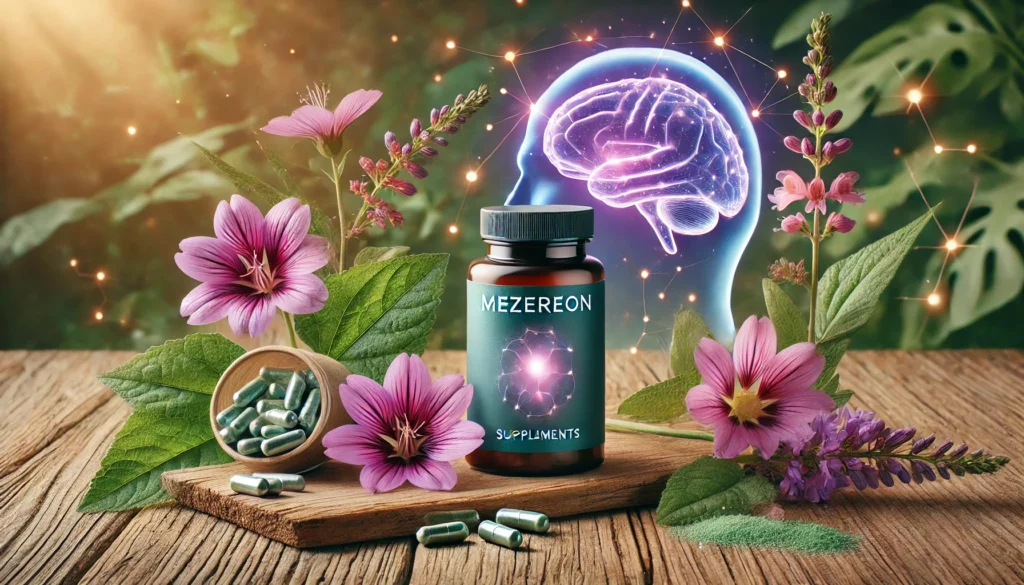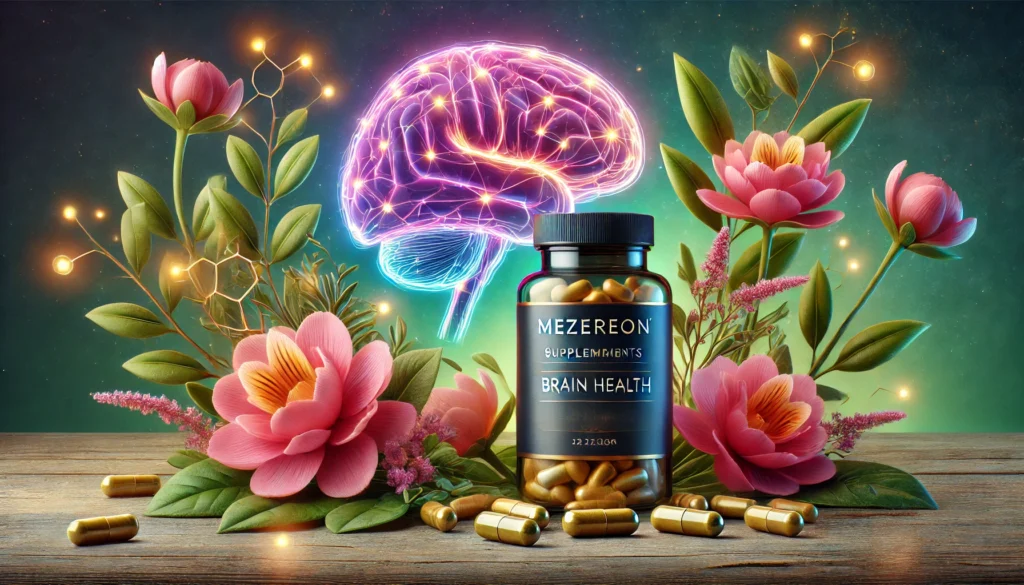Mezereon (Daphne mezereum), also known as the spurge laurel, is a deciduous shrub native to Europe and parts of Asia. Historically, Mezereon has been used in traditional medicine for a variety of purposes, including as an anti-inflammatory, an analgesic, and a treatment for skin conditions. Despite its limited modern applications in mainstream medicine, Mezereon has garnered attention for its potential nootropic properties. This article explores the chemistry, physiological mechanisms, potential nootropic benefits, dosing guidelines, side effects, interactions with other supplements and medications, and the safety considerations for using Mezereon as a nootropic supplement.
You May Also Like:
Sources of Mezereon
Mezereon is primarily sourced from the bark, roots, and berries of the Daphne mezereum plant. The plant grows in temperate regions and is particularly common in woodlands and forests of Europe and parts of Asia. While historically used for its medicinal properties, Mezereon is rarely consumed in modern herbal supplements due to its toxic components. In traditional medicine, however, Mezereon was used for a range of ailments, from treating rheumatic pains to acting as an irritant for skin diseases. Today, Mezereon is typically encountered in homeopathic preparations, often in highly diluted forms.
Active Compounds in Mezereon
Mezereon contains several bioactive compounds that contribute to its medicinal properties. These include:
- Daphnetin: A coumarin derivative that has shown potential for anti-inflammatory, antioxidant, and anti-cancer activities. Daphnetin is believed to be one of the primary compounds contributing to Mezereon’s therapeutic effects.
- Daphnetoxin: A toxic compound found in the plant that has irritant properties. It is responsible for Mezereon’s toxicity and can cause skin irritation and poisoning if consumed improperly.
- Flavonoids: These compounds are well-known for their antioxidant effects, which help protect cells from oxidative stress. The presence of flavonoids in Mezereon may contribute to its potential neuroprotective effects.
- Resins and Alkaloids: The bark and roots of the plant contain resins and alkaloids that may have mild neurostimulatory effects, although their role in cognitive enhancement is not yet well understood.
While Mezereon contains both beneficial and toxic compounds, its use in supplementation should be approached with caution, especially considering the potential toxicity of certain parts of the plant.
Ashwagandha promotes mental clarity and reduces brain fog—Optimize Your Mind, Order Now on Amazon!

Chemistry of Mezereon
The chemistry of Mezereon revolves around its complex mix of bioactive compounds, many of which have been shown to influence the body’s inflammation pathways and cellular oxidative stress. Some of the most important compounds include:
- Coumarins: Daphnetin, one of the key compounds in Mezereon, belongs to the coumarin family, which is known for its antioxidant and anti-inflammatory properties. Coumarins can modulate enzymes involved in inflammatory responses, which may have implications for reducing cognitive decline caused by neuroinflammation.
- Flavonoids: These polyphenolic compounds, such as quercetin and rutin, contribute to Mezereon’s antioxidant potential. Flavonoids are known for their ability to scavenge free radicals, which may help protect brain cells from oxidative damage that accelerates cognitive aging.
- Toxic Glycosides: Daphnetoxin, a glycoside found in Mezereon, is the primary toxic compound in the plant. While beneficial in extremely diluted homeopathic forms, the direct consumption of Mezereon can result in poisoning, characterized by skin irritation, gastrointestinal distress, and more severe symptoms such as convulsions in extreme cases.
The plant’s diverse chemical composition suggests that it may have both therapeutic and toxic properties, requiring a careful balance between dosage and safety when used as a supplement.
Physiological Mechanisms of Mezereon in the Body and Brain
The physiological effects of Mezereon on the body are complex and somewhat controversial due to the presence of toxic compounds alongside beneficial bioactive molecules. The plant’s primary effects on the brain and body can be attributed to its anti-inflammatory, antioxidant, and mild neurostimulatory properties.
Anti-inflammatory Effects
Mezereon has long been used in traditional medicine for its anti-inflammatory effects. The presence of compounds like daphnetin suggests that Mezereon may help modulate inflammatory pathways, potentially offering neuroprotective benefits. Chronic inflammation in the brain has been linked to cognitive decline, neurodegenerative diseases like Alzheimer’s and Parkinson’s, and conditions like anxiety and depression. By reducing systemic and neuronal inflammation, Mezereon could theoretically contribute to improved cognitive function and potentially slow the progression of neurodegenerative conditions.
Antioxidant Properties
Oxidative stress is one of the leading contributors to cellular aging and cognitive decline. Mezereon contains flavonoids and other antioxidant compounds that may help neutralize free radicals in the brain, thereby reducing oxidative damage to neurons. This neuroprotective effect is particularly important in the context of aging, where the brain’s vulnerability to oxidative stress increases.
Neurostimulatory Effects
Some of the alkaloids and resins found in Mezereon may exert mild stimulant effects on the nervous system. Although these effects are not as pronounced as those of traditional stimulants like caffeine, they may provide a mild cognitive boost in terms of alertness and mental clarity. This neurostimulatory effect, in combination with reduced inflammation and oxidative stress, could theoretically make Mezereon a mild cognitive enhancer.

Nootropic Benefits of Mezereon
Despite its traditional use as a remedy for various ailments, Mezereon’s potential as a nootropic is largely under-researched. However, based on the plant’s chemistry and the roles of its bioactive compounds, we can hypothesize several potential cognitive benefits:
1. Enhanced Cognitive Function through Anti-inflammatory Effects
Chronic inflammation in the brain is thought to contribute to cognitive decline. Given Mezereon’s anti-inflammatory properties, it may have the potential to improve cognitive function by reducing neuroinflammation. Studies have shown that inflammation in the brain can impair memory, learning, and other cognitive processes. By lowering inflammatory markers, Mezereon could theoretically enhance brain function, particularly in individuals suffering from neurodegenerative conditions.
2. Protection Against Neurodegenerative Diseases
The antioxidant compounds in Mezereon, particularly flavonoids and daphnetin, may help protect the brain from oxidative damage. This neuroprotective effect could potentially slow the progression of diseases like Alzheimer’s and Parkinson’s, which are characterized by oxidative stress and the accumulation of harmful free radicals in brain cells. By reducing this oxidative load, Mezereon could act as a preventative measure against cognitive decline.
3. Mild Cognitive Stimulation and Focus
The alkaloids and resins in Mezereon may have mild stimulant effects, which could help improve mental focus and clarity. While Mezereon is not likely to provide the same level of stimulation as more common nootropics like caffeine, it may offer a subtler, longer-lasting cognitive boost. This could make Mezereon useful for individuals seeking enhanced concentration or alertness during mentally demanding tasks.

Dosage and Supplementation Guidelines
Because Mezereon contains toxic compounds, especially daphnetoxin, supplementation should be approached with extreme caution. In many countries, Mezereon is not used in over-the-counter supplements due to safety concerns. However, in highly diluted homeopathic forms, Mezereon has been used under professional supervision for specific therapeutic purposes.
1. General Dosage Considerations
Due to the toxicity of Mezereon, there is no standard recommended dosage for nootropic purposes. In traditional medicine, the plant is used in highly diluted forms, such as tinctures, where the active compounds are present in minute concentrations. If considering Mezereon as a supplement, it is crucial to use it only under the guidance of a healthcare provider. Additionally, individuals should avoid consuming the raw plant or any part of it directly due to its potential to cause poisoning.
2. Homeopathic Preparations
Homeopathic Mezereon is used in very low doses, typically in the range of 6C to 30C potency. In these highly diluted forms, Mezereon may still provide some of its potential benefits without the risks associated with its toxicity. However, homeopathic treatments should be administered by a qualified practitioner who is familiar with dosage adjustments based on individual needs.
Side Effects and Safety
While Mezereon is often considered a toxic plant, the side effects vary depending on the form and dosage used. Inappropriate use of Mezereon, especially in non-diluted forms, can lead to serious health complications. Some of the side effects of improper use include:
1. Toxicity and Poisoning
The primary concern with Mezereon is its toxicity. Daphnetoxin, the toxic glycoside in the plant, can cause symptoms of poisoning, including skin irritation, gastrointestinal distress, nausea, vomiting, and even more severe effects like convulsions and death if ingested in large amounts.
2. Skin Irritation
Contact with the plant, particularly the bark and roots, can cause severe skin irritation. This is due to the irritating effects of daphnetoxin, which is released from the plant when it is handled.
3. Gastrointestinal Distress
Consuming Mezereon, particularly in improper doses or raw form, can result in nausea, vomiting, and diarrhea. These gastrointestinal symptoms are common signs of poisoning and require immediate medical attention.
4. Neurological Symptoms
In severe cases of Mezereon poisoning, neurological symptoms such as dizziness, convulsions, and even coma can occur. These effects are linked to the plant’s toxic alkaloids and glycosides.

Interactions with Other Supplements and Medications
Because of Mezereon’s toxicity, it is not commonly used in combination with other supplements or medications. However, individuals taking other supplements or medications that affect the brain or metabolism should exercise caution when considering Mezereon as a nootropic. Its potential to interact with certain drugs may amplify its stimulant effects or exacerbate the toxic side effects.
1. Interactions with CNS Stimulants
Because Mezereon may exert mild stimulant effects, it could potentially interact with other central nervous system (CNS) stimulants like caffeine or modafinil. Combining Mezereon with other stimulants could increase the risk of overstimulation, leading to symptoms such as anxiety, restlessness, and tachycardia.
2. Blood Pressure Medications
Individuals taking medications for hypertension should consult a healthcare provider before using Mezereon, as its stimulant effects could potentially interfere with blood pressure regulation.
Conclusion: Should You Consider Mezereon as a Nootropic?
While Mezereon contains bioactive compounds with promising anti-inflammatory, antioxidant, and neurostimulatory properties, its potential as a nootropic supplement is limited by its toxicity. The plant’s active compounds, such as daphnetin, may offer cognitive benefits by reducing inflammation and oxidative stress, potentially contributing to improved brain function and protection against neurodegenerative diseases. However, due to the presence of toxic compounds like daphne toxin, Mezereon should be used with extreme caution, and supplementation should only be considered under professional supervision.
At present, the safety and efficacy of Mezereon as a nootropic are not well-established, and its potential benefits are overshadowed by the risks associated with its toxic components. For those interested in cognitive enhancement, safer and more widely researched nootropics should be considered. Always consult with a healthcare provider before considering any new supplement, particularly one with potential toxic effects like Mezereon.

References:
- Mezerein: antileukemic principle isolated from Daphne mezereum L. Retrieved from: https://pubmed.ncbi.nlm.nih.gov/1114315/
- Irritant principles of the mezereon family (Thymelaeaceae), V. New skin irritants and tumor promoters of the daphnane and 1 alpha-alkyldaphnane type from Synaptolepis kirkii and Synaptolepis retusa. Retrieved from: https://pubmed.ncbi.nlm.nih.gov/3210015/
- Mezereon – Uses, Side Effects, and More. Retrieved from: https://pubmed.ncbi.nlm.nih.gov/1114315/
Important Note: The information contained in this article is for general informational purposes only, and should not be construed as health or medical advice, nor is it intended to diagnose, prevent, treat, or cure any disease or health condition. Before embarking on any diet, fitness regimen, or program of nutritional supplementation, it is advisable to consult your healthcare professional in order to determine its safety and probable efficacy in terms of your individual state of health.
Regarding Nutritional Supplements Or Other Non-Prescription Health Products: If any nutritional supplements or other non-prescription health products are mentioned in the foregoing article, any claims or statements made about them have not been evaluated by the U.S. Food and Drug Administration, and such nutritional supplements or other health products are not intended to diagnose, treat, cure, or prevent any disease.


